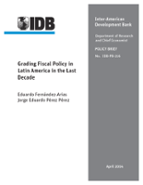Grading Fiscal Policy in Latin America in the Last Decade
Date
Apr 2014
Fiscal policy in Latin America has been historically imprudent and continues to be viewed with skepticism. At the same time, most countries have remained out of trouble for several years and were able to successfully conduct proactive countercyclical fiscal policy to fight the Great Recession, a historical first. This paper examines the last decade to assess progress, highlight weaknesses, and chart the way forward. The paper looks at structural fiscal balances, filtering out the business cycle and commodity price fluctuations to assess prudent fiscal policy concerning cyclical management and long-run sustainability. Up to the Great Recession countries deserved good grades, in the B range, on both counts. Afterwards, satisfactory cyclical management continued but, critically, extraordinary circumstances led to a regime change in the level of the underlying structural balance. Successful countercyclical fiscal policy was prudently undertaken in the crisis but not decisively unwound in its aftermath, leaving behind an unsatisfactory fiscal stance. With this "Incomplete" grades slipped to the C range and may end up as an F unless there is normalization to pre-crisis levels to regain sustainability. On a constructive note, the paper distills lessons from experience and charts the path of fiscal reform to reach an A grade.



